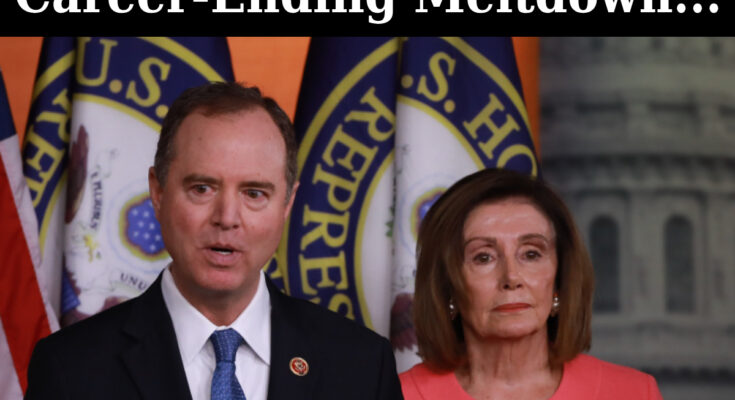In a remarkable moment of political candor, California Senator Adam Schiff shared a revealing anecdote during his appearance on HBO’s “Real Time with Bill Maher” that highlighted growing Democratic vulnerabilities in what has long been considered a safely blue state. The Friday night conversation offered a rare glimpse into the concerns of a prominent Democratic figure about his party’s standing with everyday voters, particularly on issues of crime and public safety. This acknowledgment from one of the party’s most recognizable figures signals potential shifts in the political landscape that could have far-reaching implications for both state and national politics.
A Surprising Revelation from Deep-Blue California
Schiff’s comments came in response to discussion about a recent poll showing that 50% of California respondents would consider voting for a Republican governor in 2026—a startling figure in a state that has been a Democratic stronghold for decades. California, which has not elected a Republican governor since Arnold Schwarzenegger and has maintained Democratic supermajorities in both state legislative chambers, has been viewed as virtually impregnable territory for Democrats. However, Schiff’s candid assessment suggests growing cracks in this political foundation.
“So we’re going to have to change how we do business in California,” Schiff admitted. “We’re going to have to address people’s legitimate concerns about crime.” This statement represents a significant pivot for the senator, who critics note has historically supported progressive criminal justice policies that some argue have contributed to the very issues he now identifies as problematic.
The acknowledgment from such a high-profile Democrat that California could potentially see a Republican governor in the near future signals a remarkable shift in the state’s political dynamics. For a party that has dominated California politics for years, this represents an extraordinary moment of self-reflection about voter dissatisfaction and policy effectiveness.
A Personal Experience with California Crime
What made Schiff’s comments particularly notable was his willingness to share a personal experience that informed his changing perspective. The senator recounted an incident that many Californians would find all too familiar—having his luggage stolen from his car while in San Francisco.
“I was in South San Francisco two years ago after I had an experience in the city that all too many people had when my luggage was stolen out of my car,” Schiff explained. “They tell you don’t ever leave your luggage in the car. I never do until the one time I did. And of course it got stolen.”
This experience placed Schiff among the many Californians who have fallen victim to property crime, particularly in major urban areas. San Francisco and other California cities have struggled with persistent property crime issues, including car break-ins, retail theft, and organized robbery rings. These crimes have become so commonplace that they’ve earned their own colloquial term—”smash and grabs”—reflecting their prevalence in the daily experiences of residents.
The senator’s personal brush with crime connects to a broader context of organized theft operations that have plagued California businesses and residents. Organized theft rings, sometimes operating in “flash mob” style groups, have targeted retail establishments and private vehicles with increasing frequency. Many critics point to Proposition 47, a 2014 ballot measure that reduced penalties for thefts under $950 from felonies to misdemeanors, as a contributing factor to these crime trends. Whether or not this legislation is truly responsible remains a subject of heated debate, but the perception of its impact has undeniably shaped public opinion.
The Target Store Encounter: A Political Wake-Up Call
Perhaps the most revealing segment of Schiff’s anecdote involved his subsequent visit to a Target store, where an interaction with a cashier provided what he described as a political wake-up call. After a moment of levity where host Bill Maher jokingly questioned whether the senator had visited the store without an assistant—”You went there by yourself, not an assistant?”—Schiff acknowledged with some embarrassment that he had indeed been dropped off at the store, prompting audience laughter.
“I uh… I think I went there… well yes, I had somebody drop me off at the store,” he admitted, with Maher quipping, “Well, he was honest in admitting it, right?”
The senator then described his struggles simply trying to purchase basic toiletries because security measures had become so extreme that finding staff to unlock even common items like shampoo proved difficult. This experience resonated with many California shoppers who have witnessed the transformation of retail environments, where everything from deodorant to toothpaste is now often secured behind locked cabinets due to theft concerns.
When he finally reached the checkout, Schiff recounted a particularly blunt exchange with the cashier that left a lasting impression:
“The cashier asked me if I wanted one of those Target bags with a little bullseye on it. And I said, ‘yes, that Target bag is going to be my luggage for the next two days,’” he explained. “And she asked me what happened. And I told her and she basically said in not so many words that Democrats are a***oles.”
This forthright assessment from an everyday worker in solidly Democratic South San Francisco clearly struck a chord with the senator. “And I thought, you know, if the cashier in South San Francisco at 10 o’clock at night believes that Democrats are a***oles because the shampoo is locked up and my stuff got stolen out of the trunk, we’ve got a major problem that we have to address,” he concluded.
This encounter encapsulates a growing disconnect between Democratic political leadership and portions of their traditional voting base, who may be increasingly frustrated with the tangible impacts of certain policy approaches, particularly related to crime and public safety.
Policy Contradiction and Political Evolution
Schiff’s newfound concern about crime and public safety policies stands in notable contrast to positions he has taken throughout his political career. Critics were quick to point out that the senator has consistently supported the progressive criminal justice reform measures that many blame for California’s current crime challenges. This apparent contradiction between past policy support and current concerns highlights the complex political recalibrations occurring as voter dissatisfaction becomes increasingly apparent.
The senator’s comments represent what appears to be an emerging trend among some California Democrats, who are beginning to distance themselves from certain progressive policies as public opinion shifts. This evolution reflects the political reality that regardless of ideological commitments, elected officials must ultimately respond to voter concerns or risk electoral consequences.
Political analysts suggest this shift isn’t unique to Schiff but represents a broader reassessment occurring within Democratic circles in California and nationally. As progressive policy experiments in criminal justice, homelessness, and public order have produced mixed results in major urban centers, some Democratic leaders appear to be recalibrating their approach to these issues, particularly as Republicans make inroads with traditionally Democratic voting blocs.
Democratic Messaging Challenges
Schiff’s appearance on Maher’s show follows his recent criticism of the Democratic Party’s messaging strategy, further highlighting internal party tensions about how to respond to current political challenges. In an interview earlier this month with ABC’s Jonathan Karl, Schiff expressed frustration about what he viewed as an inadequate response to President Donald Trump.
“I think the lack of a coordinated response in the State of the Union was a mistake, and frankly, it took the focus off of where it should have been,” Schiff stated in that interview. He argued that Democrats should have emphasized economic concerns more effectively: “The president spoke for an hour and 40 minutes and had nothing to say about what he would do to bring down costs for American families that were watching that lengthy address, sitting at the kitchen table hoping he would offer something to help them afford a new home or pay their rent, afford health care, or afford child care.”
This critique aligns with concerns raised by Pennsylvania Democratic Senator John Fetterman, who described his party’s situation as “a sad cavalcade of self-owns and unhinged petulance.” These internal criticisms suggest growing concerns within Democratic ranks about messaging effectiveness and policy priorities.



